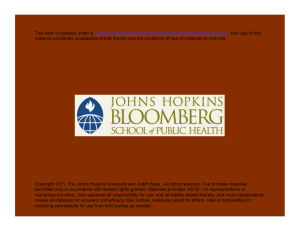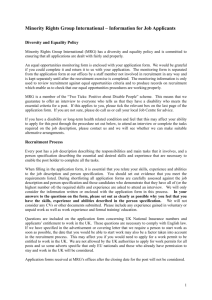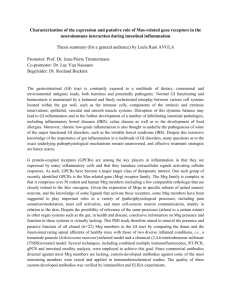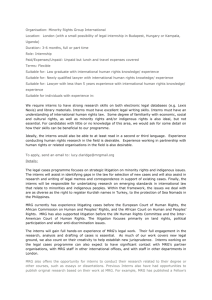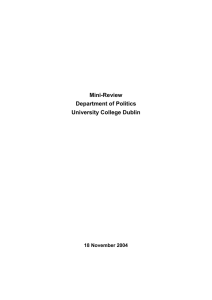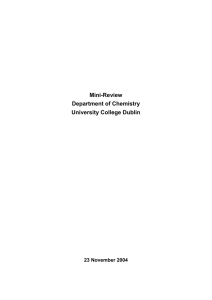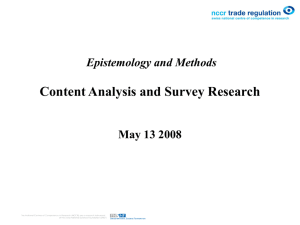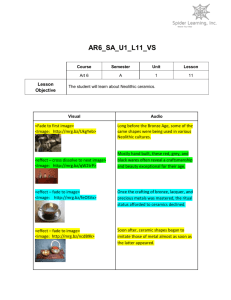Department of Planning and Environmental Policy (11/2004) (opens in a new window)
advertisement
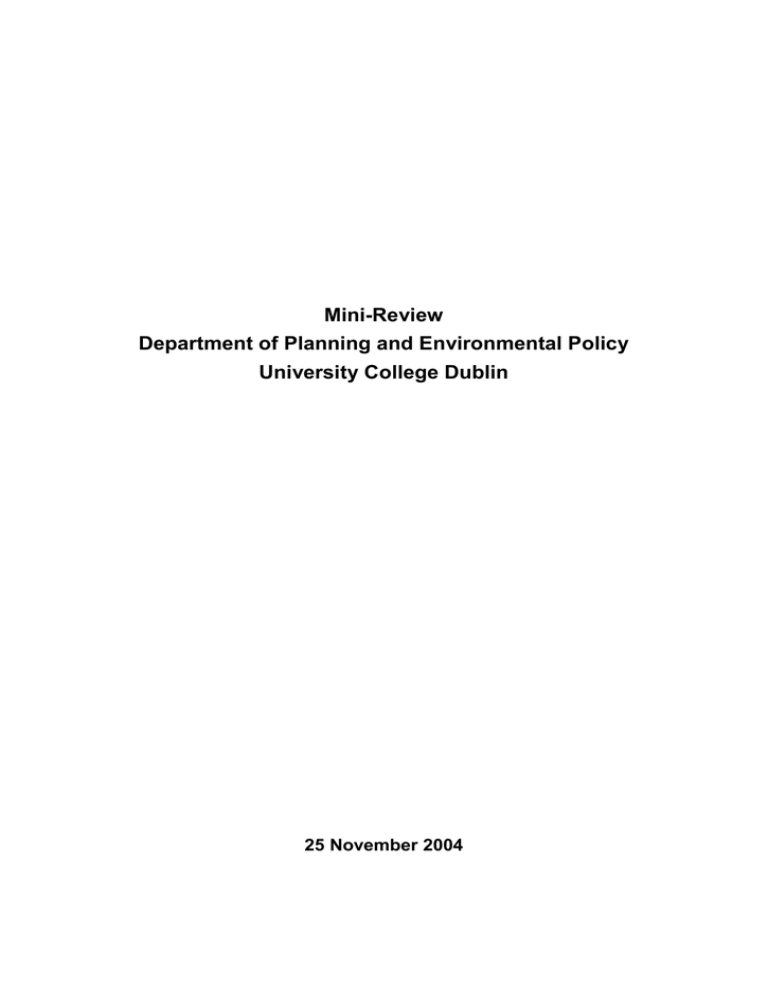
Mini-Review Department of Planning and Environmental Policy University College Dublin 25 November 2004 The Review Members of Review Group Professor Gerry Doyle Professor Mary Daly Ms Elaine Cox Head, Department of Botany, Chair Dean, Faculty of Arts Quality Assurance Office Methodology The Mini-Review Group (MRG) visited the Department of Planning and Environmental Policy (PEP) - formerly Regional and Urban Planning - on Friday, 25 November 2004. In preparation for the visit, the MRG reviewed the following documents supplied by the Department: Mini-Review Progress Report Peer Review Group Report Self-assessment Report Faculty of Engineering & Architecture Strategic Planning Dialogue A number of documents were made available to the MRG on the day of the visit: Department of PEP Information Pack PEP Master of Regional & Urban Planning Year 1 Course Yearbook PEP Master of Regional & Urban Planning Final Year Course Yearbook Department of PEP Guidelines for Postgraduate Research Students During the visit the MRG met with the Head of Department, Department staff, and student representatives. Due to a misunderstanding concerning scheduling, the MRG did not have the opportunity of meeting with the Dean of the Faculty of Engineering & Architecture. The Chair subsequently consulted Professor Lewis on issues that arose during the visit. Findings of the Mini-Review Group 1) General Comments The PEP Mini-Review relates to an organisation that is remarkably different to the original department described in the PRG Report. Many issues identified in the PRG Report have either been addressed or are no longer relevant, owing to the changed structure and organisation of the newly constituted department. The Mini-Review Group (MRG) acknowledges the work of the former Head of Department, Professor Michael Bannon, who with the support of the former Dean of the Faculty of Engineering and Architecture, Professor Vincent Dodd, instigated the processes that have resulted in the transformed department. Raising the funds to construct the new building that houses most of the 2 Department as well as doubling the student numbers in a short period of time is a remarkable achievement. The Department had a unique opportunity to develop and has taken advantage of this opportunity under the new Head of Department, Professor Peter Clinch with the support of the current Dean, Professor Lewis. The MRG were impressed with the Department in its present form. The new, young, enthusiastic, and well-qualified staff have a strategic vision for the Department and are guided by the strong leadership of the current Head of Department. The staff are understandably very proud of their Head of Department, themselves and the academic department that they have developed. By effectively creating a brand for itself, the Department has benefited from the positive effect of distancing itself from issues that may have arisen in the past, developing a strong identity and opening up new areas into which the Department can expand in teaching and research. This has increased the viability of the Department and is key to its strategic vision. The Department has grown considerably since the QA/QI Review. The increase in staff numbers has produced a critical mass that is needed for significant research development. In addition, there is now secure course delivery, which the PRG indicated was lacking. Through the merger with the Department of Environmental Studies, the PEP has broadened its scope and increased its research potential. 2) Planning and Organisation General It is clear that the Department is committed to strategically planning its future. Consideration has been given to the alignment of the Department in the current restructuring of the University and to the opportunities that will be afforded by modularisation and semesterisation. It is obvious from the MRG’s interactions with staff that they are encouraged to discuss such matters in the inclusive atmosphere of their staff meetings. All staff members are confident that they have input into the strategic vision for the Department. This is admirable as it promotes high engagement from all staff. The current Strategic Development Plan (SDP) is out of date, owing to changes in the University structure. The MRG recommends that the Department formulate a new SDP as soon as possible. It is important that the momentum that has been generated is not lost. Resources The Department has made good use of the resources available to it and has been successful in fundraising for particular projects. The MRG supports this outward-looking approach. The current alignment with the Faculty of Engineering and Architecture is good for the Department in terms of allocation of resources, since the payment per FTE in the Faculty of Engineering and 3 Architecture is currently higher than in the Faculty of Human Sciences, the other possible home for the Department. Facilities The PRG Report commented on the sub-standard facilities of the Department. This is very much changed now. The Department, through well-considered investment of funds allocated by Faculty and gained through fundraising for specific projects has transformed the facilities in which it is based. This has created a pleasant working environment and a professional appearance that will help to attract external investment. The PRG recommendation that the University should ensure that the Department has access to a room of sufficient quality to host meetings with senior research contractors is no longer relevant, since such a room is now available in the new Building. The improvements to Departmental facilities started with initial fundraising to build the PEP building and have continued through the investment in the older facilities in the PEP Research Unit in the Architecture Building. However, there is a distinct imbalance between the new and the old facilities, despite the Department’s efforts to upgrade as much as possible. The Department and Faculty have funded refurbishment of many of these older rooms, in particular those used by the PhD students. Each student now has their own desk, a computer, shelf space and storage unit. Some of the rooms, however, still need to be refurbished. The MRG recommends that the Buildings Office and Faculty support the Department in these necessary upgrades. While the Department provides shared computers for their Masters students in a multi-purpose room, these machines urgently need to be replaced. Each of the PhD students is supported under funded projects, which cover the cost of a computer. While they are working with up-to-date equipment, the computers are not supported by Computing Services. The MRG recommends that Computing Services (a) support the Department in providing computers for their Masters students and (b) provide technical support for postgraduate computing. The shared spaces in the Architecture Building are not in good repair and security is an issue. The Department is considering installing a swipe card system for entry to their space. They consider that the cost should not be the sole responsibility of the Department. The MRG recommends that the Department apply to Faculty and the Quality Improvement Finance Committee (QIFC) for some funding for this purpose. The Department has problems with the quality of cleaning and maintenance provided, something that is particularly noticeable in shared spaces. The MRG recommends that these services be improved as a matter of urgency. The PRG recommended that the opening hours of the Richview Library should be extended and that consideration should be given to the stocks and space in the development plan of the Department. Since the time of the QA/QI Review, opening hours have been extended, and additional space has been provided in the Urban Institute Ireland. There is now dedicated quiet study 4 space. The stocks of journals, books and OS maps have been increased, are up-to-date and many are available in electronic format. Staff and students comment positively on the upgraded facilities. One of the recommendations in the PRG Report was that the restaurant should experiment with a range of culinary offerings, other items for sale (e.g. newspapers) and hours of opening. Privatisation as an option might be examined. Since that recommendation was made, the restaurant, driven by the demands of departments in Richview, was replaced by an O’Briens sandwich bar. Feedback on this change is positive. 3) Teaching & Learning The Department has successfully restructured its courses and provides clear course outlines with expected learning outcomes. The MRG approves of the developments in this area. During the initial QA/QI Review some issues arose regarding the MSc in Urban Design, a shared degree with the School of Architecture. The issues with that degree, including the relationship between the School of Architecture and PEP, have since been addressed. The restructured course will start in September 2005 and both the School of Architecture and PEP now have clearly defined roles in its delivery and management. The Department has assessed all aspects of its course content and considered the potential for attracting students from other programmes in UCD to take these, particularly in light of modularisation. The diversity of academic backgrounds among the staff of the Department has created openness to interdisciplinarity that is highly appropriate in the context of the current restructuring of the University. Their consideration of collaboration with other Departments has led them to identify common interests with the Social Sciences, Architecture, Civil Engineering and Environmental Sciences. While a full exploration by PEP of various potential Departmental alignments and their implications for teaching and learning had not been completed at the time of the MRG visit, after discussion with staff, the MRG felt that the current alignment with Architecture and Civil Engineering has merit, not just physically and financially, but also in the context of course development. However, this does not rule out collaboration or alignments in Teaching and Learning with other Departments and Faculties. In any case, the MRG recommends that the Department continue to build relationships with other departments. Although the Department does not have an undergraduate programme, such relationships will allow input into undergraduate courses that may prove beneficial in attracting postgraduates from a wider range of disciplines. The Department has integrated a number of ‘soft skills’ into their courses, including team-work, presentations skills, and basic design skills, all of which are to be commended. To date, the Department has been successful in ensuring that all PhD students are funded. This has very positive influence on the retention and 5 completion rates (in 3 years) of students. The MRG strongly supports this policy. The instigation of monthly seminars has been very effective and has positive feedback from students. The recommendation of the PRG that the Department formulate a policy on Continuing Professional Development (CPD) for planners has not yet been fully addressed. The Department has developed a proposal for some CPD elements and is looking on this as a longer-term objective. The MRG endorses the PRG’s recommendation since this could be a good source of funding for the Department. The MRG recommends that CPD be included in the Department’s Strategic Development Plan and suggests that it be moved higher up the list of priorities. 4) Research The Department’s research profile has completely changed. Now eleven of twelve staff members have PhDs. A support system has been put in place to encourage all staff to be research active. The Department has agreed achievable personal research plans with all staff and expects that the research output will be more balanced across all staff as this reaches fruition. The Department has created a position for a Research Manager, who makes sure that all staff are up-to-date on routes for relevant funding applications, current research proposals within the Department, potential for collaboration both within and outside the Department, presentation of proposals and papers, relevant journals for publication and provides day-to-day management of research accounts. This is a very forward-thinking development that should pay major dividends in the future. The Department has links with the Urban Institute Ireland and hopes to be involved with the proposed Environmental Sciences Institute. These links are very positive and should be clarified and strengthened. With the current restructuring of the University, the Department may find common ground with other research institutes. 5) Faculty and University Support The Department did not submit a Quality Improvement Plan after the PRG Review, owing to a situation that was out of the hands of current staff members. This prevented the Department from applying for funding to the Quality Improvement Finance Committee (QIFC). The MRG recommends that the Department now applies to the QIFC for some dedicated funding. Recommendations of the Mini-Review Group The MRG recommends that the Department formulate a new Strategic Development Plan as soon as possible to build on their recent developments. 6 The Buildings Office and Faculty should support the Department in future necessary upgrades to the older facilities. The MRG recommends that Computing Services support the Department in providing computers for their Masters students and provide support for postgraduate computing. The MRG recommends that the Department apply to Faculty and the Quality Improvement Finance Committee (QIFC) for some funding towards the improvement of security in the Department. The MRG recommends that cleaning and maintenance services be improved as a matter of urgency. The MRG recommends that the Department continues to explore, and build on, opportunities for potential alignments with cognate departments. The MRG endorses the PRG’s recommendation to formulate a policy on CPD since this could be a good source of funding for the Department. The MRG recommends that CPD be included in the Department’s Strategic Development Plan and suggests that it be moved higher up the list of priorities. With the current restructuring of the University, the Department should consider building new relationships with Research Institutes. The MRG recommends that the Department now applies to the QIFC for some dedicated funding. The members of the MRG wish to acknowledge the open and friendly discussions provided by Professor Clinch and the staff of the Department. All are to be congratulated on the significant organisational and academic improvements that have taken place since the original PRG Report. 7
